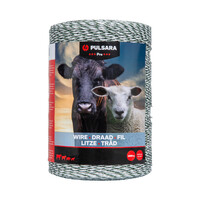Electric Fencing for Pigs


- Pulsara Pro wire 1.000m
- UV-resistant for extra durability
- 6 galvanized steel conductors
- High quality price ratio


- Pulsara Pro wire 1.000m
- UV-resistant for extra durability
- 6 galvanized steel conductors
- High quality price ratio
Pigs are intelligent animals, so they soon learn to stay away from an electric fence. However, it is widely understood that pigs generally bolt forward when startled, so you should always use strong galvanised wire, not polywires or fence tapes. If weaker fencing materials are used, there is a risk that an animal could become entangled in a broken, but still live, electric fence.
Most electric fences for pigs use only two lines, one 15-25 cm from the ground and another 40-60 cm high. The lower line is designed to come into contact with the pig’s snout, especially if they are ‘snuffling’ around near the fence, while the other would come into contact with the pig’s body should it brush against it. Obviously, you should adapt the fence line heights depending on the type of pig(s) that you have or if you have piglets.
Contact us at [email protected] for help and advice about electric fencing for pigs and piglets.
Electric fence pigs refer to the use of electric fences specifically designed to contain and control pigs. These fences are constructed using electrified wires or tapes that emit a mild electric shock when touched. The purpose of electric fence pigs is to create a psychological deterrent for pigs, preventing them from escaping or causing damage to their surroundings.
There are several advantages to using electric fence pigs:
Cost-effective: Electric fences are generally more affordable compared to traditional fences, making them a cost-effective solution for pig containment.
Easy installation: Electric fences for pigs are relatively easy to install, saving time and effort. They can be easily relocated or expanded as needed.
Flexibility: Electric fences offer flexibility in terms of fence configuration and layout, allowing you to adapt the fence to suit your specific pig containment needs.
Low maintenance: Once properly installed, electric fences for pigs require minimal maintenance, reducing the time and resources needed for upkeep.
Psychological deterrent: The mild electric shock emitted by the fence acts as a psychological deterrent, training the pigs to avoid contact with the fence and preventing them from escaping.
Electric fence pigs work by utilizing an energizer, which generates pulses of electricity and sends them through the wires or tapes of the fence. When a pig comes into contact with the electrified fence, it completes the electrical circuit and receives a short, harmless electric shock. This shock creates a memorable experience for the pig, conditioning them to avoid touching the fence in the future.
Electric fence pigs are specifically designed for containing and managing pigs. They are suitable for various types of pigs, including domestic pigs, wild boars, and piglets. Electric fences can be used for both outdoor and indoor pig enclosures, ensuring effective containment and control.
When selecting the best electric fence pigs for your needs, consider the following tips:
Fence strength: Ensure the fence is capable of delivering an adequate shock to deter pigs. Opt for fences with higher voltage or stronger pulses for larger or more determined pigs.
Wire or tape material: Choose durable materials for the wires or tapes, such as high-tensile wire or polytape, to withstand pig activity and environmental conditions.
Insulators: Select quality insulators to keep the wires or tapes properly spaced and insulated from posts or other objects, ensuring the fence remains effective.
Energizer power source: Determine the most suitable power source for the energizer, such as mains electricity, battery, or solar power, based on your location and accessibility to power.
Fence visibility: Consider using colored or highly visible tapes or flags to increase the fence's visibility, aiding in training pigs to avoid contact.
To install and use electric fence pigs effectively, follow these steps:
Plan the fence layout: Determine the perimeter or area you need to enclose and plan the fence layout accordingly, considering the terrain and any potential obstacles.
Install corner and end posts: Set up sturdy corner and end posts to anchor the fence, ensuring they are properly secured in the ground.
Install line posts: Space the line posts evenly along the fence line, ensuring they are securely installed.
Attach wires or tapes: Attach the electrified wires or tapes to the posts, maintaining appropriate tension and spacing.
Install the energizer: Connect the energizer to the fence, ensuring it is grounded properly and follows the manufacturer's instructions.
Test the fence: Before introducing the pigs, test the fence to ensure it is functioning correctly and delivering an adequate shock.
Train the pigs: Introduce the pigs to the electric fence gradually, allowing them to learn through the mild shocks. Provide visual cues, such as flags or markers, to aid in training.
Regular maintenance: Periodically check the fence for any damage, vegetation interference, or loose connections. Keep the fence clean and free from debris to maintain its effectiveness.
The recommended electric fence height for pigs is typically around 18 to 24 inches (45 to 60 centimeters). This height helps prevent pigs from attempting to jump over the fence while ensuring the electrified wires or tapes are positioned at a suitable level to deliver the shock effectively. However, it's important to assess your specific pig breed and their jumping ability to determine the optimal fence height for your situation.